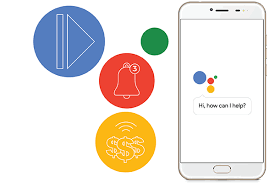 For a select group of smartphone owners, Voice Search within the Google App just morphed into Google Assistant, the entity that responds to “Okay Google” (or “Hey Google”) on what Google claims to be one billion devices around the world. The transition was first noted in 9to5Google and elaborated upon by Greg Sterling in Search Engine Land a day later. According to both accounts, Google executives signaled the company’s intention to transition from a “mobile first” to an “AI first” strategy back in January at its developer conference, Google I/O.
For a select group of smartphone owners, Voice Search within the Google App just morphed into Google Assistant, the entity that responds to “Okay Google” (or “Hey Google”) on what Google claims to be one billion devices around the world. The transition was first noted in 9to5Google and elaborated upon by Greg Sterling in Search Engine Land a day later. According to both accounts, Google executives signaled the company’s intention to transition from a “mobile first” to an “AI first” strategy back in January at its developer conference, Google I/O.
This is a giant leap for Google because its Assistant is endowed with powers and abilities far beyond those of mere mortals using Search. “Assistance”, after all, is a better metaphor than “search” when describing how elements of Artificial Intelligence (AI) can extract meaning, recognize intent, answer questions, predict outcomes and constantly improve the ability to recognize what we say. “Search” by contrast, carries the connotations of one-and-done Q&A.
Voice Search Is A Dead End
On the positive side, Voice Search has performed its job well. Wireless customers have grown confident in Google’s ability to answer spoken questions, and advertisers are amenable to having their ads displayed among the responses to these spoken queries, yet expectations are low in terms of supporting the sorts of multi-turn, complex conversations and multiple intents that Google Assistant can support.
Google joins with rivals Amazon (Alexa), Apple (Siri) and Samsung (Bixby) in making Voice Assistants ubiquitous. As evidenced at the Voice Summit 2019 in Newark last week, Amazon, Google and Samsung are making serious investments in developer programs and communities to ensure their assistants can offer a broad variety of “skills,” “actions” or “capsules”, respectively. Voice Search, in this context, is a use case; a peer to “voice control,” “voice dialing” or “transcription”. It’s dead end.
Google Assistant, on the other hand, is another step along the Conversational Commerce Continuum that Opus Research defined a few years back:
- Assistant: Recognition intent, matches with correct answers or indicated actions.
- Advisor: Based on domain knowledge and intent awareness can make recommendations in specific areas like travel/hospitality, health and wellness, financial services, shopping. Issuing alerts falls into the Advisors purview, as it can issue an outbound alert that is triggered (at the end-user’s specification) when a product is available at a desired price. Google’s construct of “routines” is also an advisory offer. Google Assistant can suggest when an individual should head to work based on a knowledge of any meetings that may have been scheduled, location, traffic conditions and time of day.
- Agent: Will be the highest form of life for an Intelligent Assistant. Its role is to act as an end-user’s intermediary to a broad array of online services. An Automated Personal Agent is knows preferred vendors, payment options, scheduling preferences and the like. It protects the individual’s privacy by determining when and why personal information needs to be disclosed and how it can be done securely.
The giant leap by Google (from Voice Search to Google Assistant), is just one small step along the Conversational Commerce continuum.
[Photo credit: Voicebot.ai]
Categories: Intelligent Assistants

 NiCE Interactions 2025: Agentic AI, Better Data, and a Whole Lot of Partnership
NiCE Interactions 2025: Agentic AI, Better Data, and a Whole Lot of Partnership  Getting It Right: What AI Agents Actually Mean for Customer Support (Webinar)
Getting It Right: What AI Agents Actually Mean for Customer Support (Webinar)  Beyond the Basics: How AI Is Transforming B2B Sales at TP
Beyond the Basics: How AI Is Transforming B2B Sales at TP  Five9 Launches Agentic CX: Toward AI Agents That Reason and Act
Five9 Launches Agentic CX: Toward AI Agents That Reason and Act